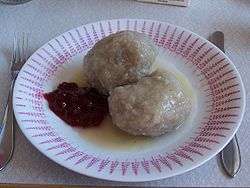Raspeball
|
Norwegian raspeball | |
| Alternative names | Klubb, kumle, komle, kompe, potetball |
|---|---|
| Place of origin | Norway or Germany |
| Main ingredients | Potatoes |
|
| |


Raspeball, also known in some areas as klubb, kumle, komle, kompe or potetball is a potato dumpling, a traditional Norwegian[1] or German dish. It consists of grated potatoes, where typically half is pre-cooked and half is raw, salt and varying kinds of flour (though often, barley is used). There are a great variety of regional variations to the dish, and in many areas the raspeball is filled with bits of salted lamb or pork.
The dish is more common in the southern (Sørlandet, where "kompe" is the most common name), western (Vestlandet, where "raspeball", "komle" and "potetball" is the most used) and middle (Trøndelag, where it is nearly always called "klubb") parts of Norway than elsewhere. In Vestlandet, this dish is traditionally consumed on Thursdays, when it often makes an appearance as "Dish of the day" at cafes and restaurants specializing in local cuisine; Commonly known as "Komle-torsdag".
The condiments vary greatly, and locally, throughout the Norwegian regions. They may include salted and boiled pork or lamb meat, bacon, sausages, melted butter, bacon fat, lard, mashed or cooked rutabaga, sour cream, soured- or kefir milk, sugar, syrup, cured meat, brown cheese sauce and, even, boiled potatoes. A variety of raspeballer is the fiskeball, where minced fish, fresh or salted, is added to the potato dough.
The raspeball is quite closely related to the Lithuanian cepelinai, the Acadian poutine râpée and the potato dumplings known as Klöße in Austria and Germany.
See also
- Kroppkakor, the Swedish name of the dumplings of this dish
- Palt, similar dish from Sweden
- Cepelinai, similar dish from Lithuania
- Pork bun, bun-like recipe from China which has some resemblance to this dish (steamed flour base surrounding a meat core)
References
- ↑ Kulchawik, L. (2015). Trade Shows From One Country To The Next:. Page Publishing. p. 220. ISBN 978-1-63417-507-4.
